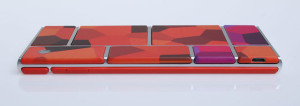 Pre-Google, who ever imagined that Motorola would be one of the world’s most forward-thinking mobile manufacturers?
Pre-Google, who ever imagined that Motorola would be one of the world’s most forward-thinking mobile manufacturers?
The company recently signed a deal with 3D Systems to develop a futuristic 3D-printing production platform for Project Ara, Motorola’s ambitious open-source mobile hardware ecosystem.
Project Ara is a push to develop modular phones, which would allow users to mix and match hardware with the ease of downloading and installing software.
Users will be able to upgrade devices with plug-in modules that could be anything from batteries to 3D scanners to toasters – really, anything imaginable. Ara, for all intents and purposes, aims to be a kind of open Android ecosystem for hardware.
When Motorola announced Ara, the company specifically mentioned 3D printing as a key technology that would make an open-source hardware market feasible.
To that end, Motorola just announced a multi-year development agreement with 3D Systems, the company that created the first 3D printer in the early 1980s and has developed 3D-printing technologies for both the personal and industrial markets.
As part of the agreement, 3D Systems has been tasked with developing an integrated, multi-material, high-speed production platform, which will include both conductive and functional materials.
Pending successful completion of the development phase, 3D Systems will be Motorola’s exclusive fulfillment partner in manufacturing 3D-printed Ara smartphone enclosures and modules.
While the specifics on a production model have yet to be announced – and presumably, such a model is not far beyond the development stage – it’s interesting to note that 3D Systems has an existing deal with Staples that allows customers to order custom parts to be printed up and picked up at a retail location.
This is perhaps a preview of a future where consumers will order a phone module and pick it up at a local physical location.
Or perhaps it might follow the Moto Maker model which allows users to design a Moto X online, after which they are assembled in a Texas plant and shipped to customers directly – no retail middleman necessary.
Or there may be a way for consumers to print a new phone at home on an (increasingly affordable) device with the same ease of printing a concert ticket on a conventional printer.
It’s fun to conjecture into the vacuum of the future, but the open-source hardware space is one that stands to disrupt the entire mobile market, especially with commercial titans backing it.





